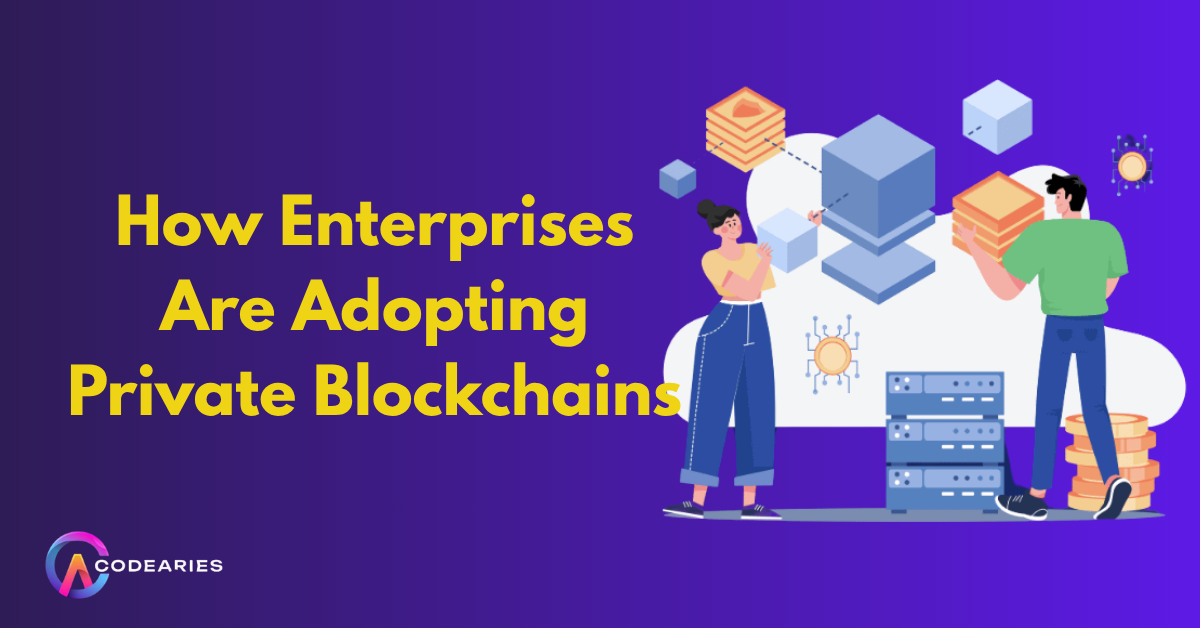
Blockchain technology has changed significantly since it first emerged. It has shifted from being the backbone of cryptocurrencies to a powerful tool for businesses around the world. By 2025, private blockchains, which are restricted ledgers for trusted users, will be key for secure, clear, and efficient business functions in various industries. Private blockchains provide better privacy, scalability, and control compared to public blockchains, making them perfect for corporate applications.
This blog looks into private blockchain adoption in businesses today, the main benefits, the challenges they face, and practical strategies for successful deployment. At the end, you will see how Codearies helps organizations use private blockchain for digital transformation and find answers to common questions.
What Is a Private Blockchain?
Private blockchains allow only pre approved users to access the system, unlike public blockchains like Bitcoin or Ethereum that anyone can join. Key features of private blockchains include:
- Permissioned access control with identity verification
- High transaction throughput and scalability
- Controlled governance by consortiums or single organizations
- Data privacy and confidentiality within trusted parties
These features meet enterprise needs for security, efficiency, and following regulations.

Why Are Enterprises Embracing Private Blockchains?
1. Enhanced Data Security and Control
Enterprises need strong data protection, especially for sensitive financial, health, or operational information. Private blockchains offer:
- Encryption and restricted access for confidential data
- Audit trails and unchangeable transactions that prevent tampering
- Controlled network participants reducing risk exposure
2. Operational Efficiency & Cost Reduction
Private blockchains reduce the need for intermediaries and manual checks by allowing automated processes through smart contracts. This cuts down on friction and administrative costs across departments and supply chains.
3. Transparency and Traceability
Distributed ledgers improve visibility into product origins, peer transactions, and contracts in systems with multiple entities, like supply chains or finance groups.
Key Use Cases for Private Blockchain Adoption in Enterprises
- Supply Chain Management: Tracking products, verifying authenticity, and ensuring compliance in food, pharma, luxury, and manufacturing industries.
- Finance and Banking: Streamlining payments, clearing, asset tokenization, and regulatory reporting.
- Healthcare: Securing electronic health records, managing consent, and enabling data sharing among authorized users.
- Government and Identity: Managing citizen records, voting systems, and decentralized identities.
- Energy and Utilities: Trading renewable energy credits, managing grids, and reducing fraud.

Adoption Trends and Market Insights
- The global enterprise blockchain market is set to reach $57.7 billion by the end of 2025, with a growth rate above 70% through 2030.
- Financial services lead in adoption, followed by supply chain, healthcare, and manufacturing sectors.
- More businesses are integrating AI and IoT, leading to smarter, autonomous blockchain solutions.
- Hybrid blockchain networks that combine private on chain data with some public transparency are becoming popular.
- Governments worldwide are exploring Central Bank Digital Currencies (CBDCs) and blockchain backed regulations, confirming the legitimacy of enterprise blockchain use.
Common Challenges in Enterprise Private Blockchain Adoption
1. Integration Complexity
Existing software and legacy systems must work with blockchain networks. A lack of standards can lead to isolated data and operational gaps.
2. Scalability Concerns
Though private blockchains can handle high transaction volumes, increasing demand requires carefully designed systems that can process transactions nearly in real time.
3. Regulatory and Compliance Uncertainty
Understanding various laws regarding data privacy, digital signatures, and crypto assets needs specialized legal and technical knowledge.
4. Consortium Governance and Stakeholder Alignment
Many private blockchains function as consortiums, which need agreed standards, decision making rights, and ways to settle disputes. Establishing these agreements takes time and effort.
Strategies for Successful Private Blockchain Deployment
- Identify High Value Use Cases: Start pilots where blockchain’s transparency and automation offer clear returns on investment or compliance benefits.
- Stakeholder Engagement: Get early agreement among IT, legal, operations, and partners to avoid resistance during implementation.
- Start Small & Scale: Begin with controlled Proofs of Concept (PoCs) before rolling out across the entire enterprise.
- Choose the Right Technology & Partners: Select blockchain platforms and development companies that offer strong security, flexibility, and support.
- Ongoing Training & Audit: Set up continuous education programs and third party audits to ensure system governance and compliance.
How Codearies Supports Enterprise Private Blockchain Success
At Codearies, we create private blockchain solutions that fit smoothly into your business ecosystem and growth plans.
Our Core Offerings:
- Custom Blockchain Architecture:
Designing private, consortium, or hybrid blockchain networks suited for your operational volume and privacy needs. - Smart Contract Development:
Setting up automated processes for supply chain, finance, and compliance with strict security checks. - API and Legacy Integration:
Connecting blockchain platforms to ERP, CRM, IoT, and external data sources for cohesive operations - Governance Frameworks:
Providing advice on consortium rules, access controls, and dispute management for networks with multiple stakeholders. - Compliance & Security:
Integrating GDPR, HIPAA, and industry best practices into your blockchain solution. - Deployment Support and Maintenance:
From pilot projects to larger scales, we offer training, monitoring, and quick response to incidents.
We help businesses fully leverage blockchain’s value while reducing risk and complexity. This transforms trust, transparency, and efficiency into real business benefits.
Frequently Asked Questions (FAQ)
Q1: What industries are adopting private blockchain most rapidly?
Financial services, healthcare, supply chain, government, and manufacturing are leading in private blockchain adoption.
Q2: How is private blockchain different from public blockchain?
Private blockchains limit users and data access for privacy and performance, while public ones are open and decentralized.
Q3: Can Codearies help integrate blockchain with legacy IT systems?
Yes, our team is skilled in connecting various business software and databases.
Q4: How do you ensure compliance with evolving regulations?
We embed legal best practices, encryption, and audit features into development while working closely with your compliance teams.
Q5: What is the typical timeline for enterprise private blockchain projects?
Proofs of Concept (POCs) can take 3-6 months to launch, while full implementations might take 12-18 months, depending on business priorities.
For business inquiries or further information, please contact us at


